Occurence Books
A unique insight into war-time rural life
By Katie Morley
The volumes from the Bishop’s Stortford Police Archives that I have recently worked on are from the period of roughly March 1915 – June 1916, and they give a unique insight into war-time rural life. Interspersed with entries about lost property, petty crimes, and straying cattle are details of dropped bombs in neighbouring counties, Zeppelin sightings, Airship flights communicated from the War Office, men spotted in trees who are “probably spies”, and an alert regarding a suspicious man riding on a “Jap” [sic] motorbike!
There is an especially funny entry about an army vehicle driving down a street and, misjudging the available space, colliding with a shop awning and damaging it. The shop-keeper was not impressed!
The two Occurrence Books I have consolidated so far have required conservation mainly on the first and last sections of the volume only. These sections needed extensive repair and the eye of a jigsaw-puzzle enthusiast to work out how the detached fragments pieced together. Once this had been done, information was revealed which would otherwise have been permanently lost!
To improve the substrate and minimise the risk of further damage during digitisation, a 0.5% w/v solution of Hydroxypropyl cellulose in Industrial Denatured Alcohol was brushed onto both sides of the unstable documents. This solution acted as a consolidant (size) and made the paper much easier to handle. The various inks and writing mediums had been previously tested to ensure they were not fugitive (i.e. would not run or smudge in aqueous or alcohol solutions) so I knew it was safe to apply such a treatment.
This consolidant also made the paper much less friable (the term “friable” means the substrate is soft and fluffy in nature, as opposed to brittle and fragmentary) and therefore much more suitable for applying tissue repairs.











Add your comment about this page
I am very pleased that this number of GOB’s have survived especially from so long ago. I remember the regular destruction of paperwork like the GOB’s during my Herts Service from 1959 until the start of computer age at stations and the end of GOB’s and the like.